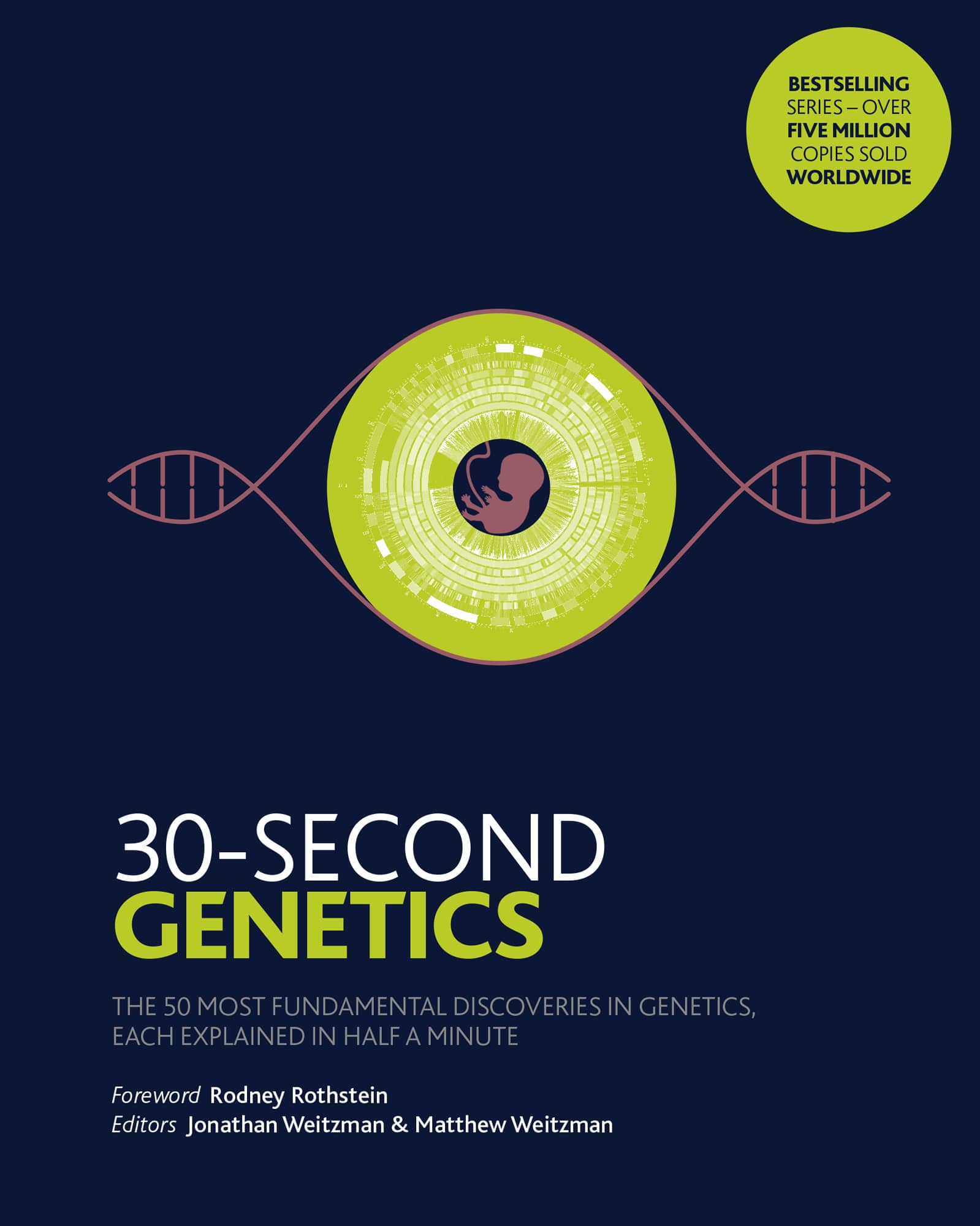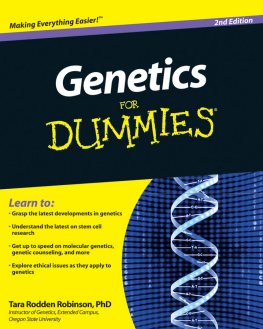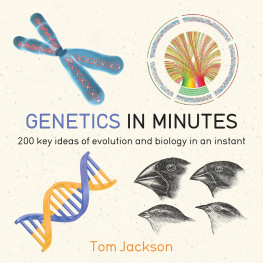Jonathan Weitzman - 30-Second Genetics
Here you can read online Jonathan Weitzman - 30-Second Genetics full text of the book (entire story) in english for free. Download pdf and epub, get meaning, cover and reviews about this ebook. year: 2020, publisher: Ivy Press, genre: Romance novel. Description of the work, (preface) as well as reviews are available. Best literature library LitArk.com created for fans of good reading and offers a wide selection of genres:
Romance novel
Science fiction
Adventure
Detective
Science
History
Home and family
Prose
Art
Politics
Computer
Non-fiction
Religion
Business
Children
Humor
Choose a favorite category and find really read worthwhile books. Enjoy immersion in the world of imagination, feel the emotions of the characters or learn something new for yourself, make an fascinating discovery.

- Book:30-Second Genetics
- Author:
- Publisher:Ivy Press
- Genre:
- Year:2020
- Rating:4 / 5
- Favourites:Add to favourites
- Your mark:
- 80
- 1
- 2
- 3
- 4
- 5
30-Second Genetics: summary, description and annotation
We offer to read an annotation, description, summary or preface (depends on what the author of the book "30-Second Genetics" wrote himself). If you haven't found the necessary information about the book — write in the comments, we will try to find it.
30-Second Genetics — read online for free the complete book (whole text) full work
Below is the text of the book, divided by pages. System saving the place of the last page read, allows you to conveniently read the book "30-Second Genetics" online for free, without having to search again every time where you left off. Put a bookmark, and you can go to the page where you finished reading at any time.
Font size:
Interval:
Bookmark:


GENETICS
The 50 most fundamental discoveries in genetics, each explained in half a minute
Editors
Jonathan Weitzman & Matthew Weitzman
Foreword
Rodney Rothstein
Contributors
Thomas Bourgeron
Robert J. Brooker
Virginie Courtier-Orgogozo
Alain Fischer
Edith Heard
Mark F. Sanders
Reiner A. Veitia
Jonathan B. Weitzman
Matthew D. Weitzman
Illustrations
Steve Rawlings

Rodney Rothstein
Genes are the building blocks that assemble in a myriad of combinations to create all forms of life on our planet. Genetics, and our understanding of genes, touches many aspects of our everyday lives including the replication of cells in our bodies and the production of sperm and eggs for reproduction, as well as complex issues that affect society such as creation of genetically modified organisms and the use of gene therapy technologies. Furthermore, doctors today are beginning to base diagnoses and treatments on their patients genetic data.
To some, the word genetics conjures up frightening images of Frankensteins monster and Jurassic Park. To counteract these fears, it is important for us as scientists to communicate our discoveries and share the science of genetics in a way that is understandable to the general public. It is clear that wider knowledge of the underlying principles of genetics will help demystify this important area of science and also elevate the level of public discussion of potential ethical issues. My colleagues Matthew and Jonathan Weitzman, themselves natural genetic clones, together with the authors of this book present fifty 30-second pieces that distil the essentials of the world of genetics. These pieces give the reader an insight into how this field grew from Gregor Mendels studies of inheritance through to the discovery of DNA as the genetic material, right up to the present of whole genome sequencing and into the future of genetic diagnosis and gene therapy.
In the end, genetics should not be feared. As we learn more about the relationships between genes, as well as their interactions with the environment, we can look forward to an exciting new era where our quality of life will be improved. The engineering of healthier food, the application of synthetic biology to facilitate the production of drugs and other compounds, and the delivery of better health outcomes through precision medicine, will all positively affect our lives.

Jonathan Weitzman & Matthew Weitzman
Few scientific disciplines have captured the human imagination like the field of genetics. Perhaps we are fascinated by it because it tackles questions at the very essence of who we are and what gives each of us our personal identities: What explains why we look like our parents? What makes us different from our brothers and neighbours? And what will we pass on to the next generation? These questions are as old as humankind, but a century ago a science was born that would provide unexpected insights, make unprecedented progress and challenge the ways we think about heredity.
The twentieth century was a whirlwind roller coaster ride, with biomedical promises and ethical challenges at every turn. The painstaking observations of Gregor Mendel allowed him to define some basic rules for the inheritance of characteristics (or traits). The rediscovery of his work at the turn of the century set the stage for exploring what is transmitted from one generation to another and how traits are determined. This new science would require new words to describe it. The British biologist William Bateson coined the term genetics (from the Greek to give birth) to describe this new science of heredity in a personal letter in 1905 and then a year later publicly at the Third International Conference on Plant Hybridization in London. Soon the words gene and genome, genotype and phenotype were born. Strong personalities abounded in this new field, all keen to uncover the mysteries of heredity. There would be moments of great achievement, like the ingenious cracking of the genetic code, or the discovery of the double helix the beautifully simple structure of the DNA molecule that would become an icon. The twentieth century closed with one of the most exciting challenges in modern biology: a race, comparable to the race to put man on the Moon. Never before had so many geneticists from around the world worked together on a project with such scope and ambition. The international Human Genome Project set out to decrypt the three billion letters that make up the human genome the Book of Life!
There is no area of biology that has not been profoundly impacted by modern genetics. Much of the progress in the field was due to the extraordinary speed with which new technologies emerged to address challenges. The realization that the way DNA and genes work is the same across the animal and plant kingdoms opened the door to a menagerie of experimental modelling systems. Discoveries in single-celled bacteria, the common bakers yeast or the lowly fruit fly provided clues to the underlying rules of genetics. Indeed, the functions of pieces of DNA could be tested by transferring genes from one organism to another. Researchers learned how to sequence, copy, synthesize and engineer DNA molecules, often exploiting the machines (or enzymes) that Nature herself had taken millennia to perfect. This extraordinary progress led to breakthroughs in understanding human diseases and the promise of a new type of genetic medicine. But the promises also brought fears and inspired macabre fiction and fantasies.
Progress continues at a breathtaking pace. Human genomes are being sequenced in their thousands, gene therapy is finally correcting errors to save peoples lives and gene editing has reached unprecedented levels of precision. The field of genetics has moved from an esoteric science of abstract concepts, to a series of technologies that will impact our daily lives. In this book we set out to share our excitement at this wonderful adventure and to demystify the science that sometimes hides behind its jargon. The words gene and DNA have crept into our everyday speech, but it is often unclear what they really mean. It is important to explain what genetics can and cannot say about who we are. The molecules and the enzyme machines that copy, interpret and protect our genomes are all microscopic, but their impact on society is gigantic and in 30-Second Genetics we want to equip general readers to participate in the debate about how genetics and genetic information will be used by society and by generations to come.
In 30-Second Genetics experts from around the globe guide us through the jargon of modern genetics from gene to genome, from the deciphering of the genetic code to the sequencing of the human genome. Here specialists demystify the terms and the concepts, and make us wonder at how much we have learned about genetics and how much we still have to discover.
Font size:
Interval:
Bookmark:
Similar books «30-Second Genetics»
Look at similar books to 30-Second Genetics. We have selected literature similar in name and meaning in the hope of providing readers with more options to find new, interesting, not yet read works.
Discussion, reviews of the book 30-Second Genetics and just readers' own opinions. Leave your comments, write what you think about the work, its meaning or the main characters. Specify what exactly you liked and what you didn't like, and why you think so.











